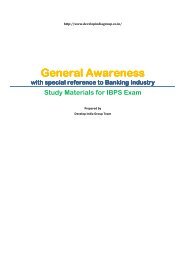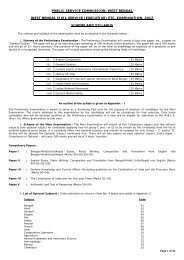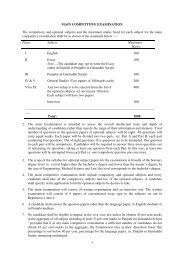Develop India Year 5, Vol. 1, Issue 243, 31 March - 7 April, 2013.pmd
Develop India Year 5, Vol. 1, Issue 243, 31 March - 7 April, 2013.pmd
Develop India Year 5, Vol. 1, Issue 243, 31 March - 7 April, 2013.pmd
You also want an ePaper? Increase the reach of your titles
YUMPU automatically turns print PDFs into web optimized ePapers that Google loves.
DEVELOP INDIA English Weekly Newspaper<br />
Allahabad; Sunday; <strong>Develop</strong> <strong>India</strong> <strong>Year</strong> 5, <strong>Vol</strong>. 1, <strong>Issue</strong> <strong>243</strong>, <strong>31</strong> <strong>March</strong> - 7 <strong>April</strong>, 2013<br />
C.S. Rajput<br />
OPINION - EDITORIAL<br />
NEW DISCOVER<br />
VERY CHALLENGES<br />
HEISENBERG'S UNCERTAINTY PRINCIPLE,<br />
ADVANCING ANCING QUANTUM MECHANICS<br />
Cyprus has agreed a 10bn euros bailout with<br />
the European Union and the International<br />
Monetary Fund (IMF) in an attempt to stave<br />
off the collapse of its banking sector and the<br />
wider economy.<br />
Cyprus has agreed to a significant restructuring<br />
of its banking sector, along with other<br />
measures such as tax rises and privatisations.<br />
The measures are designed to raise billions<br />
towards the bailout, but protect bank customers<br />
with deposits of 100,000 euros or<br />
less.<br />
Cyprus's second largest bank - Laiki Bank -<br />
will be closed down and deposits above<br />
100,000 euros moved into a "bad bank". Deposits<br />
below 100,000 euros will be moved<br />
into Bank of Cyprus, the country's biggest<br />
bank, which is being significantly restructured.<br />
Deposits at Bank of Cyprus of more than<br />
100,000 euros are being frozen.<br />
At both banks, deposits above 100,000 euros<br />
will be used by the government to contribute<br />
billions towards the bailout. It is not<br />
clear how much of the money will be taken,<br />
but a government spokesman has suggested<br />
customers should expect about 40% of the<br />
balance to be converted into bank shares.<br />
What about the bank levy?<br />
In the original EU-IMF deal, all customers of<br />
Cypriot banks were to face a one-off tax on<br />
their deposits, starting at 6.75% for the smallest<br />
deposits.<br />
That was designed to raise 5.8bn euros towards<br />
the cost of the bailout. But it proved<br />
hugely unpopular with the Cypriot public and<br />
was voted down by Cyprus's parliament.<br />
There is no bank levy in the new deal, but<br />
the bank restructuring measures mean deposits<br />
over 100,000 euros will effectively be<br />
used to pay the bulk of the 5.8bn euro bill.<br />
The measures cannot be voted down by<br />
Cyprus's parliament, as new bank restructuring<br />
laws have already been agreed and voted<br />
through by MPs.<br />
Why are there capital controls?<br />
1,000 euros in cash on trips out of the country,<br />
and transferring no more than 5,000 euros<br />
a month on debit or credit cards.<br />
Bigger transactions need the approval of Cypriot<br />
authorities.<br />
The measures were due to stay in place for<br />
just a few days, but Cypriot authorities are<br />
already indicating that they are likely to keep<br />
them in place for longer. Iceland introduced<br />
temporary capital controls in 2008, which are<br />
still in place today.<br />
Are the UK operations of Cypriot banks affected?<br />
Bank of Cyprus UK has 50,000 UK customers.<br />
Although it is a subsidiary of Bank of<br />
Cyprus, it is a separately incorporated UK<br />
bank and depositors are protected by the<br />
UK's Financial Services Compensation<br />
Scheme (FSCS), which covers savings up to<br />
£85,000. It said the crisis in Cyprus would<br />
have no effect on its deposits.<br />
Laiki Bank has four branches in Britain and<br />
serves 13,000 customers.<br />
Unlike Bank of Cyprus UK, its UK operations<br />
are directly controlled from Cyprus, and so<br />
are not covered by the FSCS. It says deposits<br />
up to 100,000 euros are guaranteed and customers<br />
are free to make withdraws if they<br />
wish.<br />
However, the UK Finance Minister, George<br />
Osborne, says the UK government is in talks<br />
with Cypriot authorities to find "a British solution"<br />
to Laiki's UK branches.<br />
So is the crisis over?<br />
Not necessarily. In the short term, the risk of<br />
the Cypriot banking sector collapsing has receded,<br />
and the bailout funds will allow the<br />
government to pay its own debts and undertake<br />
the restructuring of the banks without<br />
facing economic collapse or exiting the euro.<br />
But in other respects the outlook is less certain.<br />
Cyprus must enact tough austerity measures<br />
to rebuild its economy, and regain trust<br />
among investors in its banking sector and<br />
government. It is unclear whether the Cypriot<br />
public, angered by how the crisis has<br />
sound public finances.<br />
But during the good years, the island's banking<br />
sector grew rapidly. By 2011, the IMF reported<br />
that their assets - which include all<br />
the loans they have made - were equivalent<br />
to 835% of annual national income, or GDP.<br />
A chunk of that is down to foreign-owned<br />
banks, but those that are Cypriot had made<br />
loans to Greek borrowers worth 160% of Cypriot<br />
GDP.<br />
When Greece became engulfed in crisis in<br />
2010, Cypriot banks were hit hard, and the<br />
government did not have the money to bail<br />
them out itself. Government finances have<br />
been further weakened by slow economic<br />
growth and international lenders have<br />
stopped offering loans.<br />
Negotiations on a bailout with the EU were<br />
delayed by the previous socialist government.<br />
President Nicos Anastasiades, a conservative<br />
who favoured a swift agreement<br />
with Europe, assumed office in late February.<br />
Why was a bank levy considered?<br />
When countries get an international bailout,<br />
they are often expected to contribute to the<br />
solution by raising funds themselves, usually<br />
by increasing taxes or selling state-owned<br />
assets.<br />
The levy on bank deposits was designed to<br />
play the same role. It was intended to reduce<br />
the size of the bailout and therefore the<br />
amount of new debt Cyprus had to take on.<br />
But there is almost certainly a political aspect,<br />
too. In the eurozone, there are concerns<br />
about money-laundering in Cyprus and the<br />
presence of large amounts of Russian-owned<br />
money in the banks. Germany is reputed to<br />
be especially unhappy about the idea of using<br />
European taxpayers' money to rescue<br />
them.<br />
Experts say the decision to target ordinary<br />
savers came about because Cypriot banks<br />
have fewer private bondholders than banks<br />
in other eurozone countries. In the Greek<br />
bailout, it was private bondholders who had<br />
contracted by 1.67% in 2009, largely due to<br />
a sharp fall in its tourist and shipping sectors.<br />
Following the contraction, Cyprus experienced<br />
continuous increasing unemployment,<br />
and thus entered into a recession. From 2010<br />
to 2012 the economic growth of the country<br />
has been weak, meaning that the Cypriot<br />
economy has yet to recover to its pre-2009<br />
condition.<br />
Increasing unemployment contributed to an<br />
increasing state debt as expenditure on unemployment<br />
benefits kept increasing. Following<br />
the decision of the European Union<br />
for a haircut upwards of 50% on Greek bonds<br />
in 2011, in which Cypriot banks had invested<br />
heavily, the Cypriot financial system was unable<br />
to absorb the cost. The disproportionate<br />
size of the financial sector in relation to<br />
the rest of the Cypriot economy meant that<br />
a possible collapse of the Cypriot banks<br />
would have catastrophic results for the<br />
economy. The Cypriot state, unable to raise<br />
liquidity from the markets to support its financial<br />
sector, requested a bailout from the<br />
European Union.<br />
In September 2011, the credit rating of<br />
Cyprus was downgraded by all major credit<br />
rating agencies following the Evangelos<br />
Florakis Naval Base explosion in July 2011,<br />
which occurred within a period of slow<br />
progress for the fiscal and structural reforms.<br />
At the same time yields on its long-term<br />
bonds rose above 12%. Despite its low population<br />
and small economy, Cyprus has a large<br />
off-shore banking industry that was shaken<br />
to its foundations during the financial turmoil.<br />
With a total nominal GDP of •19.5bn<br />
($24bn) the country was unable to stabilize<br />
its banks, which had amassed •22 billion of<br />
Greek private sector debt and were disproportionately<br />
hit by the haircut taken by creditors.<br />
According to reports in the magazine<br />
Newsweek bank deposits from Russian business<br />
corporations total $60bn out of a total<br />
deposits of $120bn. The situation is also compounded<br />
by the fact that Russian oligarch<br />
EDITORIAL<br />
DEVELOP OP INDIA<br />
English Weekly Newspaper<br />
<strong>Year</strong> 5, <strong>Vol</strong>. 1, <strong>Issue</strong> <strong>243</strong>, <strong>31</strong> <strong>March</strong> - 7 <strong>April</strong>, 2013<br />
INDIA tops the list<br />
of black money in<br />
the entire world<br />
While there is no official estimate available for the magnitude of <strong>India</strong>’s black money,<br />
unofficial estimates put the figure at around $1.4 trillion (over Rs 70 lakh crore). This<br />
amount is more than one year’s GDP of <strong>India</strong>. Most of this money has been stashed<br />
away in banks in ‘tax havens’ abroad over the last 60 years by corrupt politicians,<br />
industrialists, bureaucrats and middlemen.<br />
The bulk of <strong>India</strong>’s black money is stashed away in secret bank accounts in Switzerland,<br />
according to data provided by the Swiss Bankers Association. <strong>India</strong> has more<br />
black money than rest of the world combined. <strong>India</strong> tops the list with almost $1,456<br />
billion in Swiss banks, followed by Russia $470 billion, the UK $390 billion, Ukraine<br />
$100 billion and China, with $96 billion. <strong>India</strong>n Swiss bank account assets are worth<br />
13 times the country’s national debt.<br />
<strong>India</strong> is ranked 6th on the black money top-ten countdown for illicit outflows monitored<br />
during 2002-2006. The estimated average amount stashed away annually from<br />
<strong>India</strong> during 2002-2006 is $27.3 billion. Switzerland is the top destination for illegal<br />
funds because of its strict secrecy laws. Also, Swiss banks sell additional masks to hide<br />
the identity of their rich clients, like trusts in the Cayman islands, shell companies in<br />
Panama, or foundations in Liechtenstein, all run by nominees.<br />
Political and bureaucratic corruptions in <strong>India</strong> are major concerns. Transparency International,<br />
an international organisation that ranks countries on a Corruption Perception<br />
Index (CPI), ranked <strong>India</strong> 86th out of the 180 countries ranked by it in 2009.<br />
The CPI rates countries on a scale of zero to 10, with zero indicating high levels of<br />
corruption and 10, low. <strong>India</strong>’s CPI score was a measly 3.4 out of 10, indicating fairly<br />
large levels of corruption. A 2005 study conducted by the organisation found that<br />
more than 15 per cent of <strong>India</strong>ns had first-hand experience of paying bribes or influence<br />
peddling to successfully complete jobs in public office. Taxes and bribes are a<br />
fact of daily life and common between state borders. Transparency International estimates<br />
that truckers pay US$5 billion in bribes annually. According to Transparency<br />
International, judicial corruption in <strong>India</strong> is attributable to factors such as “delays in<br />
the disposal of cases, shortage of judges and complex procedures, all of which are<br />
exacerbated by a preponderance of new laws”.<br />
A 2009 survey of the leading economies of Asia, revealed <strong>India</strong>n bureaucracy to be<br />
not just least efficient out of Singapore, Hong Kong, Thailand, South Korea, Japan,<br />
Malaysia, Taiwan, Vietnam, China, Philippines and Indonesia; further it was also found<br />
that working with <strong>India</strong>’s civil servants was a “slow and painful” process.<br />
The total share in FDI of Mauritius is 55,203 million or Rs 2,47,092.30 crore. Indeed,<br />
they are believed to be the ones leading the boom in the stock markets. But the<br />
Mauritius angle does not end there. Reports in the financial media indicate that a<br />
substantial part of FII investment is believed to be coming from Non-resident <strong>India</strong>ns<br />
(NRIs) bringing back funds to participate in the ongoing speculative orgy in the <strong>India</strong>n<br />
stock markets, much of which is said to be routed through Mauritius-based paper<br />
companies. Black money stashed by <strong>India</strong>n abroad has found way in <strong>India</strong> through<br />
this route. The Capital Gains Tax exemption giving to this Tax Haven has given the<br />
national exchequer on account of lost capital gains tax in the decade ending 2003<br />
would amount to a whopping Rs 28,139 crore. Even if it is an admitted policy of the<br />
state to woo foreign capital at any cost, the question is whether losses of this kind are<br />
acceptable to the polity at large.<br />
In a most recent example of corruption, even as the Enforcement Directorate (ED)<br />
probes US$8 billion worth transactions allegedly involving suspected money launderer<br />
Hasan Ali Khan, evidence available with a news source in <strong>India</strong> shows that he<br />
had transactions of over Rs 112,000 crore (US$24.86 billion) between years 2005 and<br />
2006. This amount is enough to fund the national drinking water project in all the six<br />
lakh villages in <strong>India</strong> for the next 10 years. Even as the Hasan Ali case has hit the<br />
headlines and the Enforcement Directorate claims that <strong>India</strong>’s biggest tax offender<br />
has as much as eight billion dollars stashed away abroad, he is only one of the big tax<br />
offenders and this stash is only a part of the huge illicit outflow from <strong>India</strong>. Documents<br />
seized by ED reveal that Hasan Ali transferred $700,000 from Sarasin Bank,<br />
Switzerland to the account of SK Financial services UK maintained with Barclays Bank,<br />
London through Citibank, New York.<br />
If the estimates of Rs 70 lakh crore of <strong>India</strong>n black money parked abroad are brought<br />
back this money can surely lift the 40 crore <strong>India</strong>ns living below poverty line out of<br />
poverty, or it can fund entire infrastructure building for the next 15-20 years. It can<br />
also educate all <strong>India</strong>n children for next 50 years.<br />
After being closed for almost two weeks,<br />
been handled so far, will support that.<br />
to take a "haircut" - a slice out of their in-<br />
Dmitry Rybolovlev owns a 10% shareholding<br />
Cyprus' banks have reopened - but with strict<br />
controls on how much money can be with-<br />
It is also unclear how much trust is left in<br />
Cyprus's banks, and so when fears over a<br />
vestment.<br />
However, the deal provoked outrage in<br />
of Bank of Cyprus.<br />
A report published in <strong>April</strong> 2012 by a team<br />
TEST SERIES<br />
drawn.<br />
This is to prevent a bank run, where customers<br />
try to withdraw all their money at once<br />
due to a lack of confidence in the banking<br />
sector. In the past, bank runs have caused<br />
banks to collapse.<br />
In Cyprus, customers are limited to withdrawing<br />
300 euros a day, taking no more than<br />
bank run will recede.<br />
Finally, the whole episode has damaged confidence<br />
in European authorities' ability to<br />
handle economic crises.<br />
What went wrong in Cyprus?<br />
Before the financial crisis struck in 2008,<br />
Cyprus was seen to have a healthy economy,<br />
with high growth, low unemployment and<br />
Cyprus, parliament promptly voted against<br />
it, and it is increasingly seen as a blunder by<br />
European and Cypriot authorities.<br />
Background of crisis<br />
Following the United States' subprime mortgage<br />
crisis in 2007-2008, which led to a<br />
domino effect of negative consequences in<br />
the global economy, the Cypriot economy<br />
of 16 Cypriot economists, organized by the<br />
citizens group Eleutheria ("Freedom"), attributes<br />
the causes of the crisis to sliding<br />
competitiveness and also to increasing public<br />
and private debt, which were both exacerbated<br />
by the banking crisis.<br />
for<br />
IAS Prelims 2013 Examinations<br />
Fee : 900/-<br />
for more details<br />
09999811970<br />
visit : developindiamediagroup@gmail.com<br />
5 DEVELOP INDIA<br />
http://www.developindiagroup.co.in/<br />
English Weekly Newspaper

















